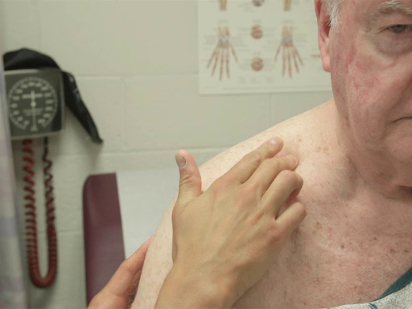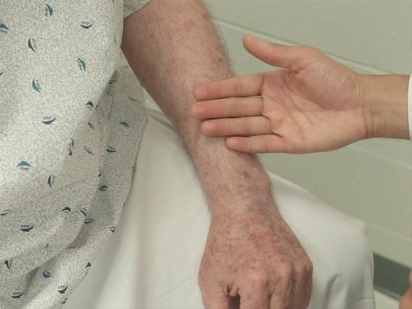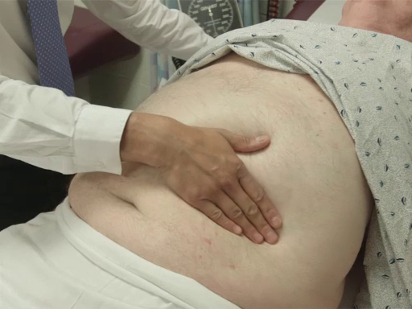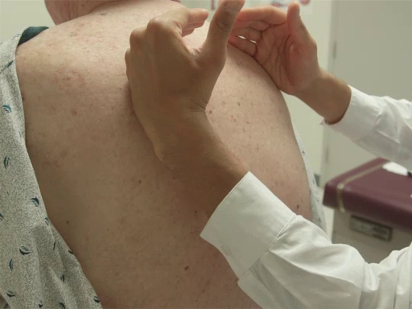Palpação
Fonte: Jaideep S. Talwalkar, MD, Medicina Interna e Pediatria, Yale School of Medicine, New Haven, CT
O exame físico requer o uso de todos os sentidos do provedor para obter informações sobre o paciente. A sensação de toque é utilizada para obter informações diagnósticas através da palpação.
As partes específicas da mão do examinador utilizadas para a palpação diferem com base na parte do corpo que está sendo examinada. Devido à sua densa inervação sensorial, as almofadas dos dedos são úteis para a discriminação fina (por exemplo,definição das bordas das massas, linfonodos)(Figura 1). A superfície dorsal da mão proporciona uma sensação áspera de temperatura relativa(Figura 2). As superfícies palmares dos dedos e mãos são mais úteis para o levantamento de grandes áreas do corpo (por exemplo,abdômen)(Figura 3). A vibração é melhor apreciada com a superfície ulnar das mãos e 5dedos (por exemplo,fremitus táteis)(Figura 4).
Embora a palpação seja fundamental para o aspecto diagnóstico do exame físico, também é importante reconhecer o papel que o toque desempenha na comunicação do cuidado e conforto durante o encontro do paciente. Os pacientes geralmente percebem o toque de um profissional de saúde de forma positiva, e suas percepções sobre um profissional de saúde podem ser moldadas pelo uso qualificado do toque durante encontros clínicos. 1 O contato físico tem sido associado a alterações nos níveis hormonais e neurotransmissores, diminui especificamente o cortisol e aumenta a serotonina. 2
Portanto, através do uso cuidadoso da palpação e do toque em geral, durante o exame físico, o médico tem a oportunidade de obter informações diagnósticas importantes, ao mesmo tempo em que desenvolve relacionamento e promove a cura.

Figura 1. Exame de linfonodo com almofadas de dedo.

Figura 2. Usando o dorso da mão para avaliar o calor.

Figura 3. Palpação abdominal com superfície palmar de dedos e mãos.

Figura 4. Usando a superfície ulnar da mão para avaliar o fremitus tátil.
1. Antes do encontro do paciente
- Mantenha as unhas limpas, arrumadas e aparadas.
- Lave as mãos com água e sabão ou solução desinfetante tópica.
- Aqueça as mãos conforme possível (por exemplo,com água morna ou esfregando-as juntas) antes do contato com o paciente.
- Se forem necessárias precauções específicas de controle de infecção para o encontro clínico (por exemplo,precauções de contato), explique ao paciente por que você está usando equipamento de proteção
Esta demonstração abrangeu as considerações gerais relacionadas à palpação durante o exame físico. Embora as técnicas específicas variem com base em cada parte individual do exame, muitos princípios gerais relacionados à palpação se mantêm durante todo o exame. A atenção à segurança e conforto do paciente é alcançada através da lavagem das mãos, da limpeza adequada, do aquecimento das mãos, das precauções de controle de infecções e do draping sensível. A parte correta dos dedos e mãos deve s...
- McCann, K., McKenna, H.P. An examination of touch between nurses and elderly patients in a continuing care setting in Northern Ireland. Journal of Advanced Nursing. 18, 838-46 (1993).
- Field, T. Violence and touch deprivation in adolescents. Adolescence. 37 (148), 735-749 (2002).
- Verrees, M. Touch me. JAMA. 276 (16), 1285-1286 (1996).
Pular para...
Vídeos desta coleção:

Now Playing
Palpação
Physical Examinations I
82.3K Visualizações

Abordagem Geral para o Exame Físico
Physical Examinations I
114.7K Visualizações

Observação e Inspeção
Physical Examinations I
92.7K Visualizações

Percussão
Physical Examinations I
99.0K Visualizações

Auscultação
Physical Examinations I
59.9K Visualizações

Ajuste adequado da vestimenta do paciente durante o exame físico
Physical Examinations I
82.7K Visualizações

Aferição da pressão arterial
Physical Examinations I
106.4K Visualizações

Medição de Sinais Vitais
Physical Examinations I
113.3K Visualizações

Exame Respiratório I: Inspeção e Palpação
Physical Examinations I
154.7K Visualizações

Exame Respiratório II: Percussão e Auscultação
Physical Examinations I
210.4K Visualizações

Exame Cardíaco I: Inspeção e Palpação
Physical Examinations I
174.5K Visualizações

Exame Cardíaco II: Auscultação
Physical Examinations I
138.6K Visualizações

Exame Cardíaco III: Sons cardíacos anormais
Physical Examinations I
90.8K Visualizações

Exame Vascular Periférico
Physical Examinations I
67.4K Visualizações

Exame Vascular Periférico Usando Doppler de Onda Contínua
Physical Examinations I
38.2K Visualizações
Copyright © 2025 MyJoVE Corporation. Todos os direitos reservados